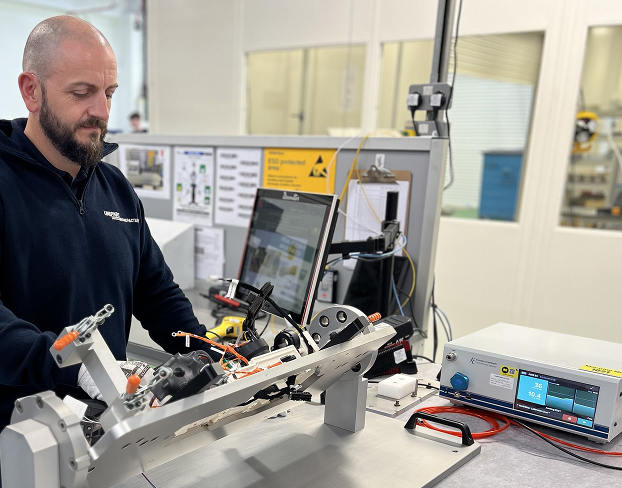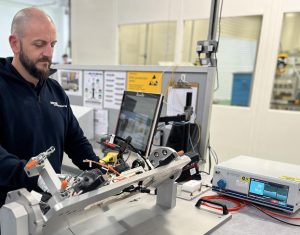
Awarded through the UK’s Advanced Propulsion Centre (APC), £44.5m is from the government and £43.5m from the automotive industry.
“Congratulations to all the companies awarded funding in this latest round of competitions facilitated by the Department for Business and Trade and industry,” said APC CEO Ian Constance. “it’s important we continue to show that the automotive sector is vital to the country’s net-zero goals and future economic growth.”
Unipart Manufacturing is a partner in one of the winning projects: PULSE – Power electronics Upscale for Localisation and Sustainable Electrification).
Led by Protean Electric, PULSE brings together five industrial partners with Coventry University and WMG (was Warwick Manufacturing Group) to industrialise the assembly and manufacture of inverters and converters in the UK.
It includes the development of in-wheel motors and fuel-cells.
“Unipart will establish a power electronics manufacturing capability at its Beresford Avenue manufacturing site in Coventry,” according to Unipart. “The facility will support the development and production of high-power dc-dc converters and inverters, leveraging vision systems, flow management and end-of-line testing to enhance efficiency and quality.”
The winning projects are:
APC Collaborative R&D (APC25) projects
R&D collaborative support via Advanced Propulsion Centre UK R&D competitions – worth £60m
- Sarginsons Industries
faster development of lighter and more sustainable aluminium castings. - Microchip Technology Caldicot
power modules for inverters - JLR
developing a UK supply-chain for automotive composites - Ford Motor Company
development, pilot and industrialisation of e-sheet, stamping and lamination. - Protean Electric
EV technologies combined with UK manufacturing of power-electronics. - European Metal Recycling
up-to 100% post-consumer scrap recycled extrusions for use in the automotive industry - Gordon Murray Group
lightweight, low CO2, monocoque architecture for vehicles - Cummins
digital analysis tool for components in hydrogen-fuelled powertrains.
Advanced Route to Market Demonstrator (ARMD3) projects
£9.1m government grant funding to projects funded through Advanced Propulsion Centre UK’s third ARMD competition, for automotive products with a clear route to market.
- Metier Technologies
subsystems for on-board hydrogen fuel systems - Altilium Metals
production and validation of battery cells containing materials recovered from battery waste - Ram Innovations
power electronics systems using GaN devices - Equipmake
energy management system for fully battery-electric fire engines. - Botanic Energy
thermoelectric refrigeration for Sainsburys last-mile zero-emission delivery vehicles - MAGTEC
next-generation drivelines for electric truck trialled by NHS Wales and Royal Mail - Renewable Metals UK
recovering materials from battery waste using alkali-based hydrometallurgy - Intelligent Energy
200kW+ regulated voltage output fuel-cell system for heavy-duty vehicles - Triumph Motorcycles
second-generation electric motorcycle software platform and supply chain - Zircotec
ceramic coatings for lightweight battery enclosures to improve thermal and electrical insulation - Wrightbus (Bamford Bus)
lightweight energy-efficient battery-electric bus demonstrator
Technology Developer Accelerator Programme (TDAP) projects:
TDAP has awarded over £2.3m government funding to companies specialising in zero-emission transport technologies
- Battery Minerals
circular supply chain by improving the economics of mineral extraction for battery waste - DeepForm
reduced waste sheet metal pressing - Electric Green
wireless vehicle charging - Enough Energy
energy storage - FLIT
folding e-bikes for urban commuters - Generational Technologies
battery assessments and performance monitoring software for electric vehicles - Ionetic
battery pack technology - Molyon
cathodes for lithium-sulphur batteries - NiTech Solutions
chemical production - Polaron
designing materials with generative AI - Raeon
‘any shape’ custom battery packs - TaiSan
quasi-solid-state sodium battery electrolyte and anode materials - Tribol Braking
composite braking components - TUAL Technology
charging for electric commercial vehicles
Automotive Transformation Fund Feasibility Study (FS5) projects:
Government investment of £2.3m through the fifth round of Automotive Transformation Fund feasibility studies (FS5) to electrify Britain’s automotive sector and protect its competitiveness in the global market.
- Anaphite
investment case for the commercialisation and scale up of dry coating precursor technology for battery electrodes - Imerys British Lithium
Validation of commercial opportunities lithium production from micaceous granite. - Talga Anode
validate case to establish lithium-ion battery anode manufacturing plant using recycled graphite from used batteries and battery-production scrap - Altilium
validation and commercialisation of a facility to recover 30,000 tonnes/annum of cathode materials from 90,000 tonnes of end-of-life EV lithium-ion batteries, gigafactory scrap and electronic waste - Nyobolt
validation of high-volume production of anode material - FluoRok
- business plan to support investment in LiPF6 manufacturing unit
- Electrified Automation
expand existing product offerings for off-highway market
Niche Vehicle Network (NVN) projects:
NVN has been awarded over £1m in government grants for UK SMEs to bring technologies from demonstration to production readiness
- Muon Tech
bring to market integrated electric drive and vehicle control unit - Carbon Threesixty
design and manufacture and test of conformable hydrogen store - Bomobility
create demonstrator e-motorcycle - Raeon
resin encapsulation for custom batteries - Quattro Plant
converting off-highway vehicles from internal combustion to battery powertrains. - FR 8 Technology
static demonstrator 16 tonne rigid delivery vehicle with a low floor
Money values above supplied by the UK Department for Business and Trade
Photo: Darren Herbert, engineer at Unipart Manufacturing







